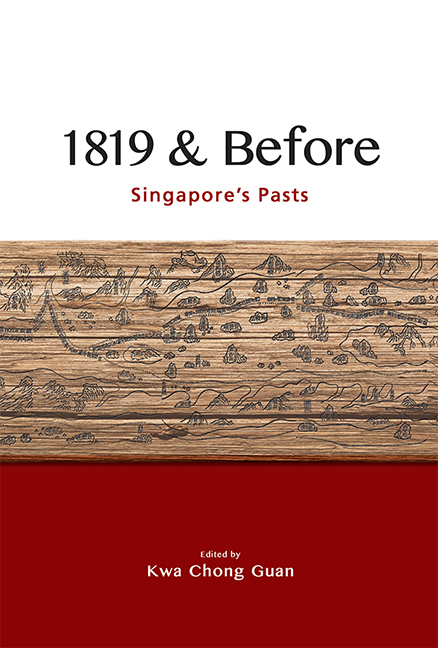Book contents
- Frontmatter
- Contents
- Foreword
- Acknowledgments
- Contributors
- 1 Introduction: Approaches to Singapore’s Past before 1819
- 2 Issues and Approaches to Studying Singapore before 1819
- 3 Regional Influences, International Geopolitics and Environmental Factors in the Rise and Demise of Temasek
- 4 The Mysterious Malay Jong and Other Temasek Shipping
- 5 The Orang Laut and the Negara Selat (Realm of the Straits)
- 6 Avoidance of Shipwreck in the Malay Annals: A Trope in Buddhist Narratives of Maritime Crossings
- 7 The Inception of Lion City
- 8 A Note on Amoghapāśa-Lokeśvara in Singapura
- 9 Portuguese and Dutch Records for Singapore before 1819: An Overview
- 10 Zheng He’s Navigation Methods and His Visit to Longyamen, Singapore
- Bibliography
- Index
3 - Regional Influences, International Geopolitics and Environmental Factors in the Rise and Demise of Temasek
Published online by Cambridge University Press: 09 October 2021
- Frontmatter
- Contents
- Foreword
- Acknowledgments
- Contributors
- 1 Introduction: Approaches to Singapore’s Past before 1819
- 2 Issues and Approaches to Studying Singapore before 1819
- 3 Regional Influences, International Geopolitics and Environmental Factors in the Rise and Demise of Temasek
- 4 The Mysterious Malay Jong and Other Temasek Shipping
- 5 The Orang Laut and the Negara Selat (Realm of the Straits)
- 6 Avoidance of Shipwreck in the Malay Annals: A Trope in Buddhist Narratives of Maritime Crossings
- 7 The Inception of Lion City
- 8 A Note on Amoghapāśa-Lokeśvara in Singapura
- 9 Portuguese and Dutch Records for Singapore before 1819: An Overview
- 10 Zheng He’s Navigation Methods and His Visit to Longyamen, Singapore
- Bibliography
- Index
Summary
Often, when we survey the indigenous sources on the founding of port-settlements and polities in the region of the Melaka Straits, we are given the impression that human agency was the prime factor that resulted in their rise and decline. While the important role of human agency cannot be denied, it is crucial for us to also consider the role of exogenous factors in creating the conditions necessary for the creation of the required geopolitical contexts for urban generation and the state formational process to occur. This is particularly so for small port-settlements and port-polities in the Melaka Straits. What were the regional circumstances that allowed for localized autonomy to be viable and the opportunity for sufficient economic self-sustainability to be developed in these settlements, especially Temasek?
Exogenous forces were, however, not confined solely to political vicissitudes at the regional and international levels. Environmental events, the occurrences of which were often beyond the control of humans but which had an impact on human activities and historical trajectories, also affected the rise and demise of port-polities in the Melaka Straits region. What were the environmental factors of the first half of the second millennium ce that affected the fortunes of Temasek?
Finally, given the role of macro-level forces and environmental factors in the fortunes of port-settlements and polities in the Straits region, it is not difficult to expect that these exogenous factors would have played a part in generating the identity and culture of the portpolities in question. What, then, were the external influences on Temasek's culture and identity?
The present essay seeks to discuss the above three issues and the role they played in the formation, establishment and demise of Temasek during the late thirteenth century through to the early fifteenth century.
Regional Forces in Maritime Asia and the Rise of Temasek
While port settlements of the Melaka Straits region were externally oriented, their respective locations determined to a large extent the direction of that orientation. Settlements in the north Melaka Straits region, for example, were generally oriented towards the Bay of Bengal and the Indian subcontinent
- Type
- Chapter
- Information
- 1819 & BeforeSingapore's Pasts, pp. 23 - 34Publisher: ISEAS–Yusof Ishak InstitutePrint publication year: 2021



